Europe's online source of news, data & analysis for professionals involved in packaged media and new delivery technologies
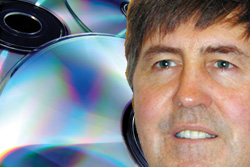
FEATURE: Evolve or Die - a personal journey through videoland
Packaged media pioneer BOB AUGER established the authoring facility that became Panasonic's base for the launch of DVD in Europe. He has lived through all the skirmishes, battles, successes and achievements of disc-based video. Now heading his consultancy Newmérique, Bob offers a personal account of the changes in the audiovisual landscape over the past five decades.
The journey from the arrival of colour in the UK to the Web TV of today has been an interesting ride. My starting point in the 1960s was at the high-tech BBC Television Centre in London, recently handed to a developer for conversion to a hotel and apartments. The closure of this temple to the art of television echoes the rise and fall of other industries, once a pillar of modern society and now discarded as old-fashioned and obsolete.
Technology is an unforgiving master: if you are not at the leading edge, you fall into the abyss. The trick is first to catch the wave and then to know when to jump off, not an easy task for people raised outside the surfing communities of California.
Innovation is inevitable, challenging traditional monopolies and providing new opportunities. Nowhere has this been more evident than in the world of packaged media. VHS has come and gone, replaced by DVD, which is itself under threat from Blu-ray as HDTV gives way to 4K video.
Now, the once-mighty cable operators and broadcasters are starting to feel the wind of change, as Netflix, Amazon and other streaming services disrupt traditional monopolies. There is one constant, as CBS Corporation CEO Leslie Moonves told the New York Times, "Our job is to do the best content we can and let people enjoy it in whatever way they want." It's a message that has taken a long time to arrive.
After 15 years "doing content" - first with the BBC, then Granada TV and subsequently with my own recording studios in Manchester, I decided to move back to London and in 1979 I became Director of AudioVisual at Molinare in the capital. On arrival, I took delivery of my first programmable computer, an AVL Eagle II running CP/M. It was, in the jargon of the time, "the bees' knees," boasting a 16kHz processor, 65k of memory and storage on a 5.25 floppy disc.
When coupled to six Kodak 35mm slide projectors, an optical multiplexer (made by a specialist company in Pittsburgh) and a Philips plumbicon colour camera, it delivered many corporate videos on Sony U-matic and quite a few local TV ads on BVU or 1" C-format video.
Advanced as it was, you could not call the AVL Eagle interactive. Everything had to be meticulously pre-programmed in a linear fashion, which was fine for corporate presentations, but not so good when accompanying live events. You have to hear six or more slide projectors simultaneously searching for a cue to know exactly what this means...
In the mid-1980s, Philips wowed a meeting of the BKSTS in London with a demonstration of high quality Laserdisc video in a computer-controlled player. The experience opened my eyes to the advantages of disc-media. Here was the perfect delivery medium, combining still images and live-action video with great sound. The added bonus of interactivity meant that I couldn't wait to try it out.
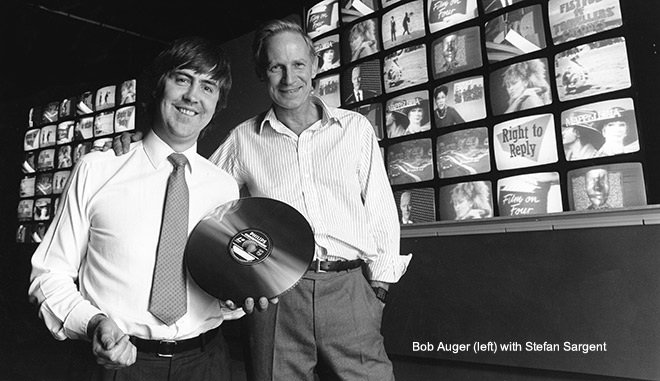
The opportunity arose with "The Golden Box," a 1986 celebration of the 50th anniversary of BBC television for the Royal Television Society (RTS). Working as co-producer with Stefan Sargent, joint founder of Molinare, the project was conceived from the start with disc delivery in mind.
With the support of Acorn Computers and Philips, the brilliant team behind the BBC Domesday Project had successfully delivered their multimedia edition of the 900-year-old census of life in England on Laserdisc. The RTS planned to commemorate the half-century of TV broadcasting with a video installation in a London venue and playback from videodisc was the obvious solution. Philips agreed to sponsor the technical side of the project.
The BBC and all the UK regional television companies (bar one) offered free access to their archives, the craft unions and rights owners waived their fees, so the problem was not so much "what to put in" as "what to leave out" With Stefan Sargent back in London masterminding the production aspects, I found myself in Eindhoven in an almost-empty warehouse, looking at 73 blank screens, a dozen videodiscs and a computer. Fortunately, Philips also provided their top programmer to stitch the multiple picture sources together. The PAL video from the discs fed a wide screen comprising a giant Eidophor video projector and two 6x6 video walls.
Things went well for the first couple of days, but then I was summoned to an emergency meeting. The 10Mbyte HD drive on the controlling computer was full and we were still some way off completing the programming. The problem was swiftly resolved and the show ran continuously for several weeks without a hitch.
Laserdisc and the MCA equivalent DiscoVision offered better picture quality and greater longevity than tape-based formats and established disc media as the way forward. However, the limited running time (one hour per side on linear discs) and the physical size of the media were obstacles to consumer acceptance.
Video compression seemed to be the answer and in the early 1990s I worked with an Atlanta-based company called Iterated Systems. Based on the theoretical work of the British mathematician Professor Michael Barnsley, "Fractal Video" was a technology that offered remarkable compression ratios and full frame rates. It was while working on this project that an IBM executive told me there is "no place for video in a personal computer," a fact he demonstrated by trying to run the fractal file with an EGA (4-bit, 16-colour) video card.
In partnership with John Paul Docherty, who founded the pioneering UK computer animation company Electric Image, I started Electric Switch in 1993, initially to exploit a promised contract to convert the entire TV ad archive of a major advertiser to fractal video. The arrival of the 12cm Compact Disc Interactive (CD-i) format seemed to be a solution to the delivery of full-motion, full colour images to the screen, but the promised MPEG-1 video cartridge was delivered late and proved unreliable.
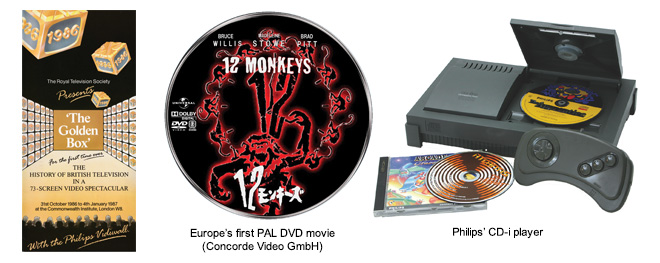
Nevertheless, Philips sold us the first real-time MPEG-1 encoder in the UK and together with other customers across Europe, we set out to create full-motion video for CD-i developers. It was only later that we heard that our supplier was telling potential customers that real-time encoding was not as good as non-real-time software encoding!
Despite the false start with CD-i, real-time encoding gave Electric Image a head start in successfully bidding for the contract with British Telecom to supply more than 400 hours of digital video to their research department in Martlesham, for trials of something they called ADSL. It was to be many years before this acronym returned, in a form that threatened the very existence of physical media!
Then, in 1995, came rumours of a new 12cm disc format that would accommodate playback of titles such as Gone with the Wind (two minutes shy of four hours) from a DVD9 dual-layer single-sided DVD.
Determined to be among the first to work with the new format, I contacted a good friend at Panasonic, with whom I had worked on a number of Video-CD titles, and asked who to contact in Japan. His response amazed me: the authoring system used to create Panasonic?s first DVD titles was written and supplied by Matsushita-owned Panasonic OWL - and the company was based in Edinburgh, Scotland.
OWL Development Manager Lindsay Holman suggested a trip to DVCC, which at that time was located within Universal Studios in Hollywood. There, I met Jerry Pierce, who was responsible for the technical launch of DVD for Universal and saw with my own eyes the quality that was achievable from DVD with the best real-time encoding technology. A visit to CES 1997 followed, at which the deal with Panasonic was confirmed: Electric Switch became the sole European operator of the Panasonic encoding and authoring system, on condition that the equipment was insured for $800,000!
It was truly a complete DVD creation system, capable of seamless branching that ensured equal buffer size at in- and out-points, a true emulator (not a simulator) which displayed any and all authoring and encoding problems prior to replication, and the ability to emulate dual-layer discs.
For one of the first demo discs, produced under pressure and on time by Nimbus in Wales for the IFA show in Berlin, the customer asked for dual-layer demo discs. Electric Switch and Nimbus pulled out all the stops, worked through the night and delivered a very few discs, where they worked perfectly for the duration of the show.
More than a year later, in casual conversation with the company who ordered the discs, I asked why we had done no work for them since. "Well, after we came back from Berlin, we sent them to a testing house and they said they found lots of flaws," was the reply. I vowed then never to deliver a disc that had not been through the test pressing and rigorous quality control procedure.
After a difficult first year, the Royal Bank of Scotland sent in its specialist advisors to assess the financial viability of DVD. Its conclusion - that "DVD is going nowhere and will follow CD-i into oblivion" - cost several people their jobs and ensured the loss of independence of the company. Electric Switch had everything it needed to meet the imminent demand for DVD authoring - except European customers!
By the end of 1999, the average price of DVD hardware was tumbling, down by 35% over the year. More than 70,000 players were sold in December alone, according to the UK DVD committee, at the bargain price of £299 ($480, €380) each.
Better times were clearly on their way, under the ownership of VHS duplicators Rank Video Services and with a team producing some really innovative titles. Leaving the operation in the hands of a great team, including technical wizard Ges Hinton and compressionist Andy Lagowski, I moved on to pastures new in North America, commissioned by British Trade International and based in Montréal, Canada.
It was here that I came across an intriguing project, which combined the best attributes of a DVD player with the interactive capabilities of Compact Disc Interactive and an online connection. A company called the Ohana Foundation, based in Hawaii, USA, had secured the contract to convert the VHS libraries of three major educational publishers to DVD. It had also signed a contract with the People?s Education Press (PEP) in Beijing, to create an "English for China" series of DVD titles, using Ohana's proprietary eWhiz! DVD disc and player format to combat piracy.
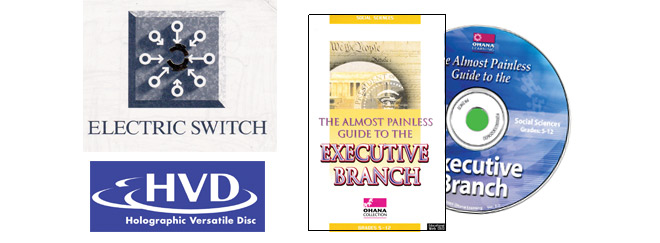
After several months of work Ohana had delivered just four DVD titles and I was called in as consultant, to sort out the log-jams in production and to work on the China project. It quickly became clear that the task would need my full-time attention, so in the summer of 2001 I reluctantly moved myself, the family and four cats to Honolulu.
The concept was well founded and once sufficient storage space was made available on the servers for the vast amounts of data that was created, the problems of execution were resolved. QC stations, using prototypes of the specialist players, helped to increase throughput.
With increased automation of the authoring process, output of educational titles rose to several DVD masters per day. The project for China was going well and when the PEP sent over its top people from Beijing to look at the work in progress, they pronounced themselves delighted with the results. So happy, in fact, that they announced plans to run a small "pilot project" in just 4,000 schools.
Which is where the wheels started to come off the project. While use of the proprietary disc format had seemed like a good idea, there was no budget for the manufacture of 4,000 eWhiz! players to Chinese standards, no small item when mass-produced consumer players still cost $200 or so to produce. The first (and probably last) DVD-interactive player never went into mass production.
After the terrorist attack on the Twin Towers in September that year, our return to the UK became inevitable. Ohana had planned a big product launch at the National School Board conference in Atlanta in November, but this was cancelled and the staff laid off. Ohana was a bold experiment that failed, but members of the Ohana team have found success elsewhere, particularly with the pre-school Pencilbot ?FeedMe!? titles from Edutainment Resources, which was originally DVD-based, but blossomed after the launch of Apps for the iPhone and iPad.
Back in the UK, I found myself defending HD DVD in the two-year "format war" with Blu-ray. At the Mediatech conference in 2005, a Frankfurt banker said that he viewed HD DVD as "an interim solution," with Blu-ray as "the storage medium of the future because of its greater capacity." My response then - which I stand by now, even with the arrival of HEVC - was, "HD DVD is an affordable, evolutionary product that builds on existing replication lines. The Blu-ray proposal is revolutionary and its capacity is not big enough to cope with future developments."
Contrary to the perception that there was an either/or choice between HD DVD and Blu-ray, there were other format proposals for disc-based media in the pipeline. The Optware Corporation had announced that "Holographic Video Discs (HVD) are likely to have a 200GB capacity, increasing over time to a maximum of 3.9TB". Speaking on behalf of the HVD Alliance Promotions Committee, Yasuhide Kageyama said, "We are expecting 500GB discs to be delivered within three years." Today, it would be ideal for 8K video, but it was never launched as a commercial product.
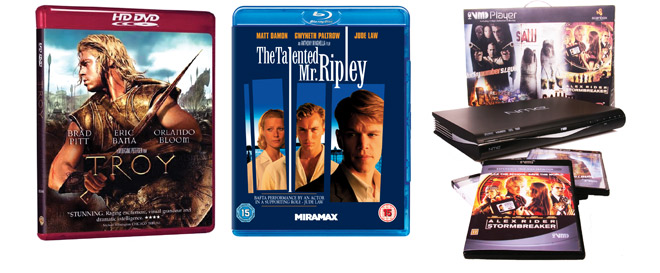
Then there was HD-VMD (High Definition Versatile Multilayer Disc), a multi-layer, double-sided format that met many of the capacity requirements of 1080p video, using the proven red laser infrastructure, instead of the new blue laser technology required by Blu-ray.
Devised by New Medium Enterprises (NME), HD VMD offered a total of 30GB capacity, on up to five addressable layers on either side of the disc. NME CTO Eugene Levich said at the time that BD drives cost 10 times as much to make as HD DVD and HD VMD, because the latter drives are essentially the same as DVD, but with different firmware.
The ML622S HD VMD consumer player was backwards compatible with DVD and did an excellent job of up-converting existing DVD titles to 1080p HDTV video. At $150 - about half the HDTV player price and just over a quarter that of Blu-ray players - it promised equal or greater playing time than competing formats.
Although there was merit in both HD DVD and HD VMD, neither secured long-term studio support. However, consumer enthusiasm for the more expensive Blu-ray format was slow to materialise, even after it won the format battle. In retrospect, I still believe a red laser solution would have been both technically and financially preferable, leaving Blu-ray or its successor to enter the market when higher resolution video arrived.
In 2008, in a piece titled "When Better Compression Comes Along" for the trade publication Cue Entertainment, I wrote, "Good though some modern compression methods may be, it will be a long while before the current crop of codecs is superseded."
In fact, it took five years for High Efficiency Video Coding (HEVC) to be ratified as the standard to succeed H.264/MPEG-4. At the 2014 IBC show in Amsterdam, 8K HEVC encoded video looked superb at a mere 100Mbps. That's 135GB for a three-hour movie - a challenge for Blu-ray, but not impossible.
I arrived in TV as the BBC began to phase out its 405-line monochrome broadcasts in favour of 625-line colour. Today's over-the-top Web TV service streams HDTV at an impeccable frame-rate and picture quality via the open internet to smart TVs. Mobile operators use 3G and 4G services to lower bit-rate versions to hand-held devices, with acceptable results on the smaller screen.
Younger viewers have come to rely on their mobile devices for entertainment and information and the typical family group no longer gathers around a single large screen. A recent survey from comScore found that, in the group aged between 18-34, around one in six had not watched any original TV series on conventional TV within the previous month. Is the TV itself now to be discarded as an old-fashioned and obsolete way to "consume content"?
The arrival of 4K video provides a positive incentive for viewers to return to the big TV screen and Blu-ray discs are still the perfect delivery format for video in the home. However, with Netflix offering access to four simultaneous 4K streams for just $11.99 (£7.49, €9.49) a month and high-quality content widely available, does packaged media stand a chance?
My working life began when UK TV was only available in black and white and home video was just a dream. Now the concept of broadcasting is itself in question and "ownership" of content lasts just as long as your online provider stays in business. Looking back over the years, packaged disc media that you can play anytime looks quite a bargain when compared to a subscription to Netflix and a monthly broadband bill.
Contact Bob Auger at: bob@newmerique.com
This is one of several editorial features included in the DVD and Beyond 2015 magazine, now available. Ask for your free copy.
Story filed 23.03.15




















